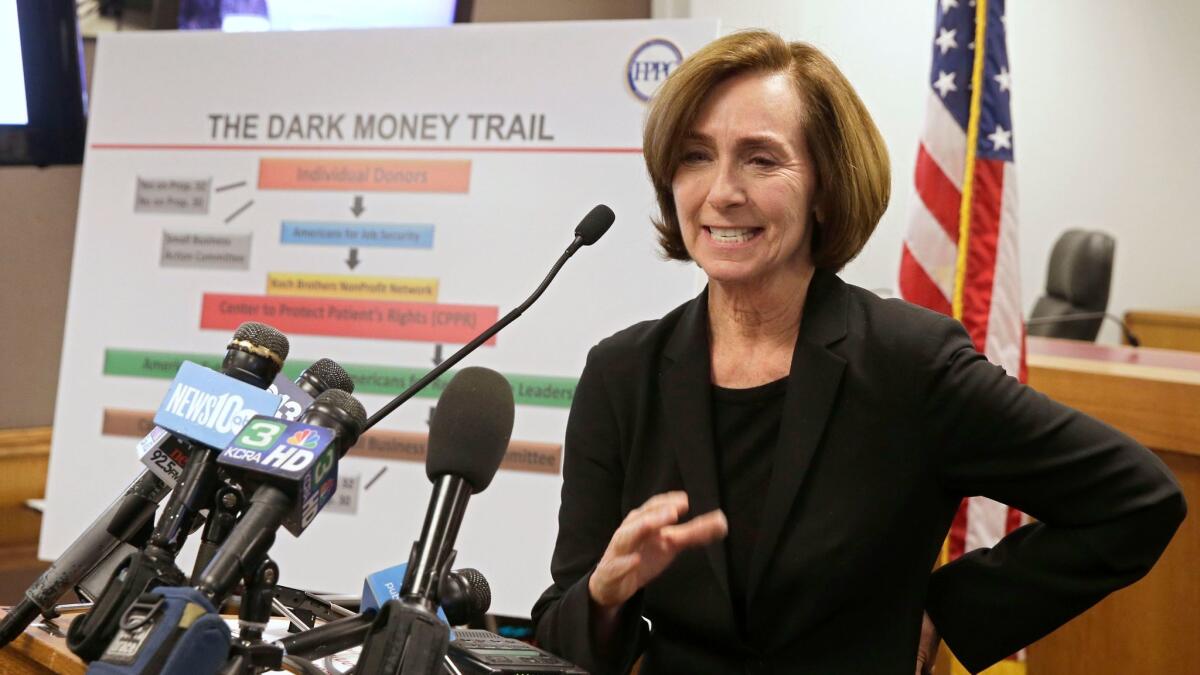Column: Political Road Map: If you think itās time to rein in money in politics, look to Sacramento or to Californiaās voters

If thereās any lesson Ann Ravel could take away from her time in Washington spent watching the big money of political campaigns, perhaps itās this: If you want something done right, do it yourself.
And so when it comes to shining a brighter light on some of the more mysterious money in politics, Ravel sees no sense in waiting for action from the nationās capital.
āWeāre going to have to look to the states,ā said Ravel, who last weekend resigned her seat on the Federal Election Commission and is on her way back home to California.
Ravel rode a fast rocket to the top of the campaign finance world, having never worked on the subject before Gov. Jerry Brown selected her in 2011 to chair the stateās Fair Political Practices Commission. Two years later, President Obama appointed her to the FEC.
What she found was a federal agency in a partisan standoff when it came to overseeing how billions of dollars are spent on campaigns ā or even whether it should play any role at all. Itās why Ravel, who will teach at UC Berkeleyās law school this fall, said it may now be time for homegrown action.
Political Road Map: Campaign spending on California ballot measures broke a record in 2016 Ā»
āStates are now realizing that they need their own laws,ā she said in an interview last week.
Some believe California is ahead of the curve, with rules put in place during Ravelās tenure in Sacramento. Those rules were prompted by a case in which $11 million was funneled through a network of nonprofit organizations into a political action committee deeply involved in two 2012 ballot initiative campaigns. In 2015, the FPPC added additional regulations surrounding disclosure of donors whose money passes through nonprofit groups.
Efforts like that are more likely to survive legal challenges, UC Irvine law professor Rick Hasen points out.
āWhat the Supreme Court has done in disclosure is give a wide berth to the states,ā he said. āI think thereās a lot that can be done.ā
State legislators, who have wrestled with disclosure bills several times in recent years, will again consider this spring an effort to force additional disclosure in funding of campaign advertisements.
Thereās also an opportunity for voters to impose more transparency through Californiaās ballot initiative process. Thatās how the stateās landmark 1974 political reform law was enacted, one thatās in the process of being updated by campaign finance officials.
Whatās less likely to stand in the courts are new attempts to rein in the outsize role of contributions to independent political action committees. The U.S. Supreme Court ruling in the 2010 Citizens United case remains intact.
Still, Ravel wonders whether several states, all offering slightly different rules, might thwart any additional one-size-fits-all rulings on campaign money. Hasen is less optimistic.
āI donāt believe that states will have that much maneuvering roomā on setting new contribution limits, he said. āLaws have been struck down for everything but disclosure. I expect that trajectory will continue.ā
The only other option may be more public financing, where some models have survived court challenges. Gov. Jerry Brown signed a law last year allowing additional cities and counties in the state to use taxpayer dollars for political campaigns.
Ravel, for one, says sheāll keep at it when it comes to connecting the dots between whoās giving and getting campaign cash. She hasnāt decided how to stay involved after leaving the FEC, but said the issue is too important to abandon.
āI care a lot not just about campaign finance, but about its impact on civic engagement and peopleās trust in government,ā she said.
Follow @johnmyers on Twitter, sign up for our daily Essential Politics newsletter and listen to the weekly California Politics Podcast
ALSO:
Californiaās secretary of state loses an effort to rebut Trumpās voter fraud accusations
Political Road Map: Does California spend more money on schools or prisons?
Updates on California politics and governnment
More to Read
Get the L.A. Times Politics newsletter
Deeply reported insights into legislation, politics and policy from Sacramento, Washington and beyond. In your inbox three times per week.
You may occasionally receive promotional content from the Los Angeles Times.











